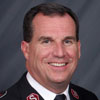 Are we there yet?” Over the summer months, the question is posed by children from the back seats of thousands of cars travelling along Canadian highways. Despite the distractions of video games, mini DVD players, comic books and sibling rivalry, the exasperation builds and builds until the question is repeated: “Are we there yet?”
Are we there yet?” Over the summer months, the question is posed by children from the back seats of thousands of cars travelling along Canadian highways. Despite the distractions of video games, mini DVD players, comic books and sibling rivalry, the exasperation builds and builds until the question is repeated: “Are we there yet?”
While the more philosophical among us might say, “Relax, it's all about the journey,” most of us respond with, “No, not yet.” It's a logical answer, as the car is still moving.
Generally, this is followed by another query: “How much farther?” The answer can be quickly found with a glance at the GPS. Less than 50 kilometres leaves all the passengers happy; any more than that will find the driver slinking lower into her seat.
As the summer draws to a close and we prepare to return to our routines at work, school and church, it's important that we determine our destination. Where is The Salvation Army headed? And how long will it take us to get there?
Our mission statement says that we “exist to share the love of Jesus Christ, meet human needs and be a transforming influence in the communities of our world.” General John Gowans (Rtd) suggests that the Army was created by God “to save souls, grow saints and serve suffering humanity.” In light of our mission, we need to give serious consideration to what our destination looks like territorially and also locally at every corps and ministry centre.
These are questions for the “we,” not just “me.” By divine design, we share this journey in community with other believers. As we consider these questions and explore how best to apply the Army's mission, we will be better informed and positioned by working together with those in our corps ministry boards, corps councils, senior/junior pastoral care councils, management teams and community councils.
If we're not there yet, then the question of “How much farther?” requires us to evaluate where we are currently. Just as a GPS unit identifies our present location, ministry leadership teams help identify and articulate where we are now and where we should go next. A GPS looks beyond itself, receiving and comparing signals from at least three or four satellites. We, too, will gain a more accurate evaluation of ourselves when we are ready to receive and compare the information offered by soldiers, adherents, employees, clients and people in our community.
With a fresh view of our intended mission destination, and a clarified understanding of our progress, we will be better prepared to commit to the next steps together as partners in the gospel (see Philippians 1:3-6).
 Colonel Floyd Tidd is the chief secretary of the Canada and Bermuda Territory.
Colonel Floyd Tidd is the chief secretary of the Canada and Bermuda Territory.
Questions for Coffee and Conversation
Where are we headed? What is our focus? Where are we now?
1. Sharing the love of Jesus
In the Gospels, how did Jesus show love to others? In the Book of Acts, how did the Early Church pick up on that example and share the love of Jesus? What will effectively sharing the love of Christ look like in our community? What will be the results? And how do we prepare for them?
2. Meeting human needs
What are the needs in our community? How do we identify those needs? What is putting dignity out of reach for some people? What voices can clarify our understanding? What are specific needs we can target that would have the greatest impact?
3. Being a transforming influence in the communities of our world
What does Jesus mean when he says we are salt and light in our world? Where could we bring the impact of salt and light in our local community? What difference would this make? How can we be salt and light in this coming year?









If those questions asked again, what will be the answer for today?
God bless every step
in Him
RC